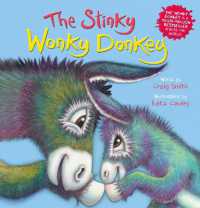- ホーム
- > 洋書
- > 英文書
- > History / World
Full Description
Take a seat on the front lines of the past, and experience history and the evolution of Western thought from the perspectives of everyday citizens, prominent public figures, celebrated authors and philosophers, and more. This collection of over 400 primary sources -- with introductory essays to help you get the most out of each reading, and review questions to help you check your understanding -- emphasizes the intellectual history and values of the Western tradition. Sources are grouped around important themes in European history, including developments in intellectual and religious thought, warfare, revolution, and socio-economic change. And because history is always in the making, you'll also find essays on current topics and vexing issues that you read about in the news, including the European Union, ISIS, and Muslim immigration in Europe.
Contents
VOLUME II
Part I: EARLY MODERN EUROPE.
1. The Rise of Modernity.
The Humanists' Fascination with Antiquity -- Petrarch, The Father of Humanism; Leonardo Bruni, Study of Greek Literature and a Humanist Educational Program; Petrus Paulus Vergerius, The Importance of Liberal Studies. Break with Medieval Political Theory -- Niccolò Machiavelli, The Prince. The Lutheran Reformation -- Martin Luther, Critique of Church Doctrines. European Expansion -- William Carr, The Dutch East India Company. The Atlantic Slave Trade -- John Newton, Thoughts Upon the African Slave Trade; Malachy Postlethwayt, Slavery Defended; John Wesley, Slavery Attacked. A Secular Defense of Absolutism -- Thomas Hobbes, Leviathan. The Triumph of Constitutional Monarchy in England: The Glorious Revolution -- The English Declaration of Rights.
2. The Scientific Revolution.
Galileo: Confirming the Copernican System -- Galileo Condemned by the Inquisition. Advocacy Of Experimental Science -- Prophet of Modern Experimental Science; William Harvey, The Circulation of the Blood; Herman Boerhaave, A New Method of Chemistry. The Autonomy of the Mind -- Rene Descartes, Discourse On Method. The Mechanical Universe -- Isaac Newton, Principia Mathematica. The Limitations of Science -- Blaise Pascal, Pensées.
3. The Enlightenment.
The Enlightenment Outlook -- Immanuel Kant, "What Is Enlightenment?". Enlightenment Political Thought -- John Locke, Second Treatise on Government; Thomas Jefferson, Declaration of Independence; Montesquieu, The Spirit of Laws; Jean Jacques Rousseau, The Social Contract; Thomas Paine, Rights of Man. Attack on Religion -- Voltaire, A Plea for Tolerance and Reason; Thomas Paine, The Age of Reason; Baron d'Holbach, "Religion is a mere castle in the air". Epistemology -- John Locke, Essay Concerning Human Understanding; Claude-Adrien Helvetius, Essays on the Mind and a Treatise on Man. Compendium of Knowledge -- Denis Diderot, Encyclopedia. Humanitarianism -- Caesare Beccaria, Condemning Torture; John Howard, State of Prisons in England and Wales; Denis Diderot, Encyclopedia: "Men and Their Liberty Are Not Objects of Commerce. . . . ". Literature as Satire: Critiques of European Society -- Voltaire, Candide; Montesquieu, The Persian Letters. Madam du Chatelet: A Woman of Brilliance -- Madame du Chatelet, An Appeal for Female Education. On the Progress of Humanity -- Marquis de Condorcet, Progress of the Human Mind.
Part II: MODERN EUROPE.
4. Era of the French Revolution.
Abuses of the Old Regime -- Arthur Young, Plight of the French Peasants; Emmanuel Sieyés, What Is the Third Estate?. The Role of the Philosophes -- Alexis de Tocqueville, Critique of the Old Regime. Liberty, Equality, Fraternity -- Declaration of the Rights of Man and of the Citizen. Expansion of Human Rights -- Olympe de Gouges, Declaration of the Rights of Women and the Female Citizen; Society of the Friends of Blacks, address to the national assembly in favor of the abolition of the slave trade; Petition of the Jews of Paris, Alsace, and Lorraine to the National Assembly, January 28, 1790. The Jacobin Regime -- Republic of Virtue; General Ligniéres Turreau, Uprising in the Vendée; The District of Saint-Quentin, De-Christianization. Napoleon: Destroyer and Preserver of the Revolution -- Napoleon Bonaparte, Leader, General, Tyrant, Reformer; Madame de Staël, Critic of Napoleon.
5. The Industrial Revolution.
Early Industrialization -- Edward Baines, Britain's Industrial Advantages and the Factory System; Adam Smith, The Division Of Labor. The New Science of Political Economy -- Adam Smith, Against Government Intervention in the Economy; Thomas R. Mathus, On the Principle of Population. The Dark Side of Industrialization -- Sadler Commission, Report on Child Labor; James Phillips Kay, Moral and Physical Dissipation; Friedrich Engels, The Condition of the Working Class in England. Factory Discipline -- Factory Rules. The Capitalist Ethic -- Samuel Smiles, Self-Help and Thrift. Reformers







